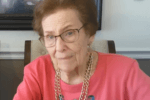November is Alzheimer’s Awareness Month. Today an American develops Alzheimer’s disease every 68 seconds. Its victims are often younger than you might think.
For instance, at the young age of 53, Paul Terkeltaub learned he had Alzheimer’s. Now he’s beginning his long good-bye.
“Because that’s what this is like,” he said, holding back tears. “Is, just having to deal with this, where you see yourself slipping every day. And that’s the hardest thing to deal with.”
Forgetting: ‘Absolutely Terrorizing’
He sees Alzheimer’s as much more than just losing your keys or missing an exit. It’s visiting someone’s home for the hundredth time and not recognizing a thing.
“And it may only take you five seconds to get back on track to figure out where you are and begin to straighten things out in your mind,” Paul said, speaking from experience. “But that five seconds is absolutely terrorizing.”
Paul retired early to enjoy his remaining years with wife Marcy, his high school sweetheart.
“I’ve always been the one to take care of her,” Paul said. “And it’s going to be tough to face the fact that I won’t be able to do that at some point in time.”
Marcy said she and Paul are facing life with as much courage as they can muster.
“We’re just living our lives day by day and I kind of don’t think about the future,” she said.
A Disease With No Survivors
Paul and Marcy hope a cure will be discovered before it’s too late for them. But they’re discouraged because so little is spent on Alzheimer’s research: only $500 million a year.
Compare that to $6 billion for cancer research, $4 billion for heart disease research, and $3 billion for AIDS research.
Dr. Dave Morgan, who heads up a leading Alzheimer’s research facility, called the reason Congress allows so little for Alzheimer’s flat-out age discrimination.
“They say, ‘Oh, that’s old-timers disease. Who really cares about these old folks?'” he said.
Plus, celebrities with other diseases bring attention and support for what they’re going through.
You don’t really see that with Alzheimer’s.
“The problem is, we have cancer survivors who are going out and talking to people, and they’re telling people how the research is so important to them,” Morgan said. “In Alzheimer’s, we don’t have survivors.”
A Drain for Medicare?
Even though Alzheimer’s hits its victims and their caregivers the hardest, the cost hits us all, and it’s going to get worse.
This year more than $200 billion will be spent treating our 5 million Alzheimer’s patients. And as Americans age, the number of Alzheimer’s patients is expected to hit 16 million by 2050, along with $1 trillion a year in medical costs.
“We need to spend more money at the federal and the state level on Alzheimer’s research,” Morgan said. “That’s the only way we’re ever going to avoid having this disease completely decimate Medicare. I mean it won’t even survive until 2030.”
Hope through Diet
Although there’s no cure or effective treatment for Alzheimer’s, scientists say our everyday lifestyle choices can make a big difference.
Studies show diets high in sugar raise your risk of Alzheimer’s.
Also, seniors who ate lots of trans fats had smaller brains, one of the hallmarks of the disease, according to Dr. Gene Bowman, the lead investigator of a study conducted at Oregon Health and Science University.
“We know that in Alzheimer’s disease that the brain shrinks at an accelerated pace as the disease and pathology spreads to certain parts of the brain,” he explained.
“But if you have a larger brain and more brain tissue you might have a reserve to handle that pathology better,” he added.
That same study found that seniors with the largest brains ate diets high in vitamins B, C, D, E and Omega-3 fats.
Coconut oil may also help prevent Alzheimer’s. It reportedly reversed the symptoms in hundreds of patients, to the degree that the Byrd Alzheimer’s Institute is now conducting the first-ever study on the effects of coconut oil on Alzheimer’s patients.
“At least up until this time all we can say is there’s anecdotal information that it may be beneficial,” Morgan said. “There hasn’t been any kind of research study that’s been done and so we really can’t know for certain.”
Finding Real Hope
So while nourishing your brain may help, challenging it can, too.
For instance, people who speak more than one language have lower rates of Alzheimer’s. Doctors also recommend doing crossword puzzles and other brain-teasing games.
They also advise staying mentally engaged in life, like working.
In fact, a recent study found that those who delay retirement decrease their risk by four percent each year they stay on the job.
Physical exercise helps, too. Mounting evidence suggests that raising your heart rate for at least 30 minutes several times a week can make a huge difference.
Even with all this knowledge, the real hope for beating Alzheimer’s is to find a cure or effective treatment.







Leave a Comment
You must be logged in to post a comment.